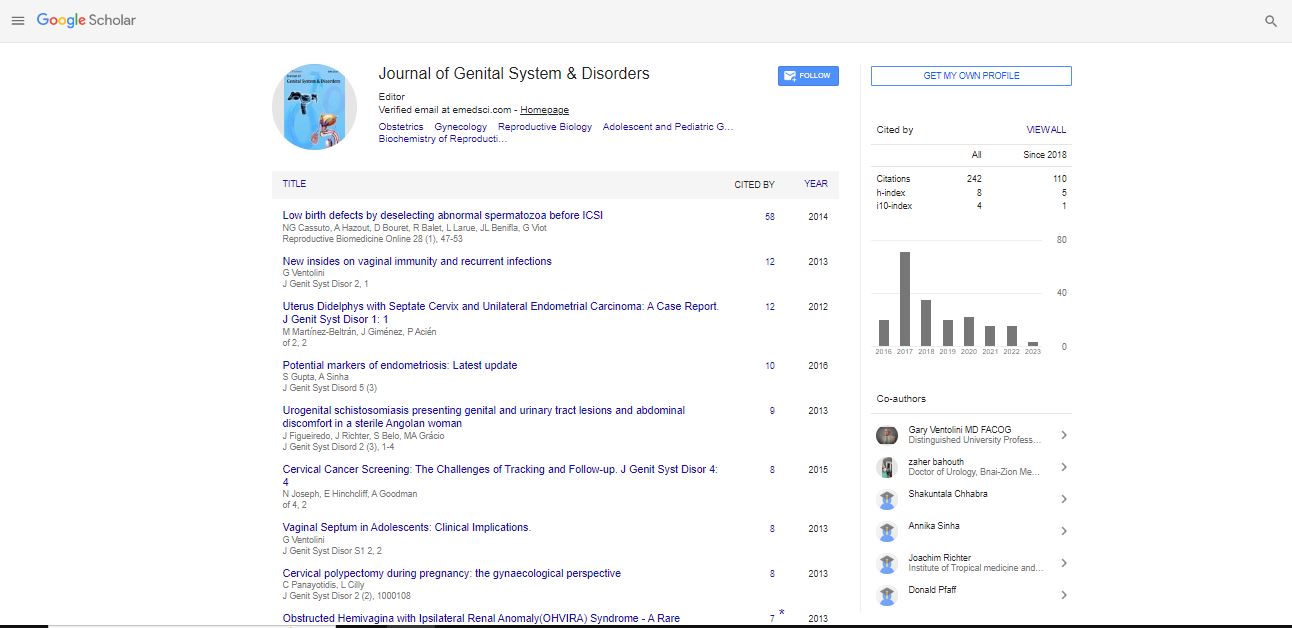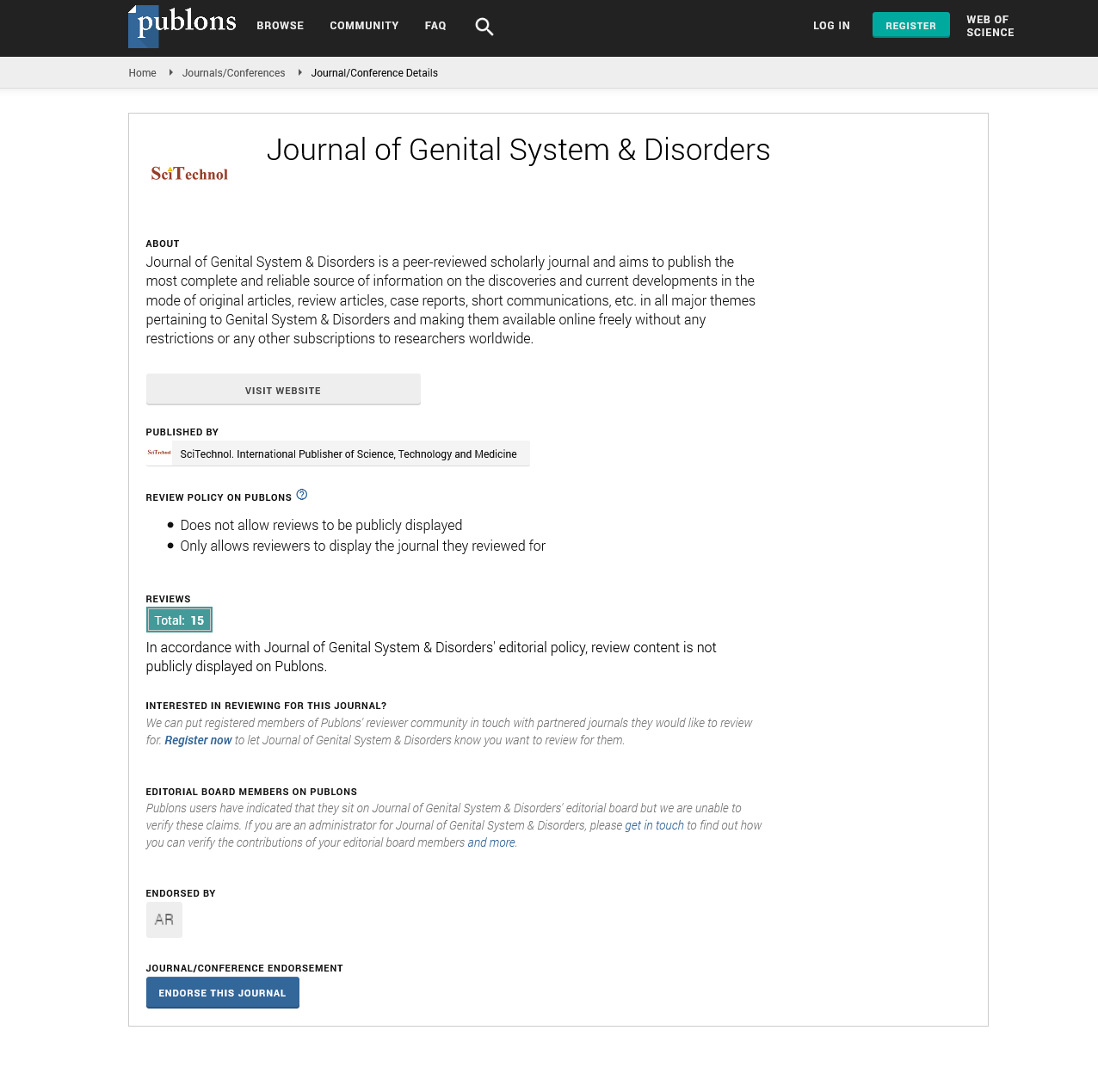Perspective, Vol: 14 Issue: 1
Interdisciplinary Perspectives in Reproductive Biology: Exploring the Intersection with Stem Cell Research, Oncology, and Endocrinology
Maria Garcia*
Department of Reproductive Biology, Stanford University, USA
*Corresponding Author: Maria Garcia
Department of Reproductive Biology, Stanford University, USA;
E-mail: Mariagarcia@su.edu
Received date: 02 March, 2024, Manuscript No. JGSD-24-128696;
Editor assigned date: 04 March, 2024, QC No. JGSD-24-128696 (PQ);
Reviewed date: 18 March, 2024, QC No. JGSD-24-128696;
Revised date: 03 March, 2025, Manuscript No. JGSD-24-128696 (R);
Published date: 10 March, 2025, DOI: 10.4172/2325-9728.1000282
Citation: Garcia M (2025) Interdisciplinary Perspectives in Reproductive Biology: Exploring the Intersection with Stem Cell Research, Oncology, and Endocrinology. J Genit Syst Disord 14:1
Introduction
The field of reproductive biology is undergoing a paradigm shift as researchers increasingly recognize the complex interplay between reproductive health and other disciplines, such as stem cell research, oncology, and endocrinology. This interdisciplinary approach offers new insights into understanding the underlying mechanisms of reproductive health issues and provides novel strategies for addressing challenges in fertility, pregnancy, and reproductive disorders.
Description
Stem cell research has emerged as a pivotal area of investigation with profound implications for reproductive biology. The ability of stem cells to differentiate into various cell types has significant implications for gametogenesis, embryonic development, and reproductive organ function. Researchers are exploring the potential of stem cells in regenerative medicine for treating infertility, reproductive organ damage, and developmental disorders. Furthermore, stem cellbased technologies, such as In vitro Gametogenesis (IVG), hold promise for revolutionizing assisted reproductive techniques and fertility preservation.
Oncology intersects with reproductive biology in multifaceted ways, especially concerning the impact of cancer treatments on fertility and reproductive function. With advances in cancer therapies enabling higher survival rates, understanding the long-term reproductive implications of these treatments has become crucial. Additionally, research into the molecular pathways underlying both cancer and reproductive processes has unveiled shared mechanisms, offering opportunities for the development of targeted therapies and predictive biomarkers for reproductive health and cancer.
Endocrinology plays a pivotal role in regulating reproductive function through the intricate orchestration of hormonal signaling. The endocrine system's influence on fertility, pregnancy outcomes, and reproductive disorders has spurred collaborative investigations into hormone-based interventions and novel treatment modalities. By elucidating the interconnectedness between endocrine pathways and reproductive health, researchers are paving the way for personalized approaches to fertility management and reproductive health optimization.
The convergence of these diverse fields has propelled the development of interdisciplinary approaches aimed at untangling the complexities of reproductive biology. One such approach involves leveraging insights from stem cell research to advance reproductive tissue engineering, offering potential solutions for infertility and reproductive organ dysfunction. By combining expertise from oncology and reproductive biology, researchers are identifying strategies to mitigate the reproductive toxicity of cancer therapies and preserve fertility in individuals undergoing cancer treatment. Similarly, the integration of endocrinology with reproductive biology has catalyzed advancements in hormone-based therapies for reproductive disorders and optimized fertility treatments based on individual hormonal profiles.
Furthermore, interdisciplinary collaborations have led to the identification of common molecular pathways and biomarkers shared between reproductive health and other disciplines. This crossdisciplinary knowledge exchange has facilitated the discovery of novel targets for therapeutic intervention and the development of precision medicine approaches tailored to individual reproductive health needs.
In addition to scientific advancements, the interdisciplinary approach in reproductive biology has spurred ethical, legal, and societal discussions. The convergence of stem cell research with reproductive biology has raised ethical considerations surrounding the use of assisted reproductive technologies, genome editing, and the implications of germ line modifications. Collaborations between oncology and reproductive biology have underscored the importance of fertility preservation counseling for cancer patients, prompting ethical deliberations on balancing cancer treatment efficacy with longterm reproductive implications. Interactions between endocrinology and reproductive biology have prompted discussions on the ethical implications of hormone-based interventions, especially in the context of fertility optimization and reproductive health management.
Conclusion
The intersection of reproductive biology with stem cell research, oncology, and endocrinology has ushered in a new era of interdisciplinary collaboration and innovation. By combining diverse expertise and perspectives, researchers are unraveling the complexities of reproductive health and advancing novel strategies for addressing fertility challenges, reproductive disorders, and pregnancy complications. This interdisciplinary approach holds immense promise for transforming the landscape of reproductive biology and improving reproductive health outcomes across diverse populations.
 Spanish
Spanish  Chinese
Chinese  Russian
Russian  German
German  French
French  Japanese
Japanese  Portuguese
Portuguese  Hindi
Hindi 
